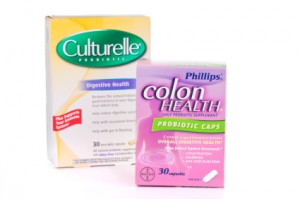You have probably heard a fair bit about probiotics and what they can do for your health. Probiotics are “good bacteria” that help with several health issues, including poor digestion. They are often found in fortified food or yogurt, but they can also be taken as a supplement in powder, pill, or liquid form.
Probiotics is the name for several types of good bacteria. Two of the most commonly heard forms are called Lactobacillus acidophilus and Bifidobacterium bifidum. These work to aid digestion by making it easier for your body to break down the food you eat. It also keeps various viruses at bay, making you less susceptible to illness.
Probiotics To The Rescue!
 One of the problems that probiotics help with is irritable bowel syndrome (IBS). IBS sufferers experience gastrointestinal distress, diarrhea and abdominal cramps. It is not know why IBS occurs in some patients and not others, but it appears, at least in some cases, to concur with an infection in the intestines. Probiotics work to calm the stomach and ease digestion, taming some of the symptoms of IBS.
One of the problems that probiotics help with is irritable bowel syndrome (IBS). IBS sufferers experience gastrointestinal distress, diarrhea and abdominal cramps. It is not know why IBS occurs in some patients and not others, but it appears, at least in some cases, to concur with an infection in the intestines. Probiotics work to calm the stomach and ease digestion, taming some of the symptoms of IBS.
Researchers at Harvard University also found that probiotics seemed to help keep sufferers of Crohn’s disease in remission. Crohn’s disease is an autoimmune disorder and a type of inflammatory bowel disease. It causes cramping fever, diarrhea, weight loss, and pain when defecating. The exact cause is not known.
Probiotics also seem to be linked to lower incidence of urinary tract and vaginal infections. Many women suffer from recurring vaginal or urinary tract infections, often caused by taking birth control, taking antibiotics, or from sexual intercourse. Probiotics work to restore the balance of bacteria within the body and correct these issues.
Probiotics may even play a role in cancer prevention and cancer treatment recovery. Two specific types of probiotics, Streptococcus thermophilus and Lactobacillus bulgaricus, seem to slow the cellular mutations within the colon, which effectively prevents colon cancer. They control the body’s natural inflammatory response and support healthy colon function. Probiotics also fight off unhealthy bacteria, thus reducing your chances of infection.
Types Of Probiotics
There are three main types of probiotics, each of which confers a different benefit:
Lactobacilli encompass several different strains, with the most well known being L. acidophilus, L. casei, and L. sporogenes – all which are often found in yogurt and fermented milk products. Lactobacilli are known for their ability to treat and prevent yeast infections, urinary tract infections, and diarrhea.
Bifidobacteria are most commonly found in supplements. They are used to regulate digestion, aid in bowel function, and calm the irritation associated with gastrointestinal infections. Bifidobacteria also helps reduce inflammation within the intestines and neutralize nitrates from the food we eat, which strengthens our immunity to the certain unhealthy bacteria.
The lesser-known probiotics streptococcus and homeostatic soil organisms (HSOs) sound a little bit more threatening, but they are actually very beneficial. Streptococcus calms an inflamed bowel and can work as an antioxidant. It is sometimes found in yogurt or in combination with other probiotics and has been used to treat bad breath. HSOs are found within the soil and end up in the plant-based food that we eat. They acidify the intestines and aid digestion. HSOs are best found in nature (from whole food) and generally do not need to be supplemented.
Strains Of Probiotics And Their Specific Benefits
What type of probiotic you choose will depend on what you are using it for. Since different strains offer different benefits, it’s a good idea to talk to your health care provider about what he or she suggests. Not all strains of probiotics are created equally.
The Secret “Survival Vitamin” You Should Buy And Bury Immediately!
The probiotic Bifidobacterium infantis has been used to treat the symptoms of IBS. It seems to improve bowel movements, reduce pain associated IBS, and reduce bloating. It is commonly found in its pure form in capsules or within a supplement that contains a combination of probiotics.
If you are seeking a natural solution to allergy problems, another strain of bifidobacteria might be helpful. One study found that probiotic therapy, in the form of Bifidobacterium lactis, decreased allergic inflammation in infants. The probiotic changed the composition of bacteria within the gut and aided in antigen elimination.
Women find L. acidophilus helpful in preventing and treating yeast infections. It is easy to find in yogurt; simply read the label to ensure that you are choosing a brand that has this strain of probiotic. L. acidophilus also inhibits the growth of certain harmful pathogens including listeria and staphylococci. It may also help inhibit carcinogens from wreaking havoc on your body.
Interestingly, the probiotic Lactobasillus rhamnosus has been linked to lowered anxiety levels. In one study, mice were given supplements of L. rhamnosus for six weeks. It was found that one particular neurotransmitter (GABA) was affected by the supplementation. GABA is responsible for slowing neural activity. Drugs that treat anxiety disorders typically affect the GABA receptors. This is exciting research for those who suffer from chronic stress and want to treat it without the use of medication. L. rhamnosus has also been shown to boost immune system functioning.
Streptococcus, while not as easy to find, may help with halitosis or bad breath. One study had subjects consume Streptococcus salivarius for three days and some subjects consume a placebo. The results found that the streptococcus-treated group had less black-pigmented bacteria in their saliva. Researchers concluded that the probiotic was an effective treatment for halitosis.
Homeostatic soil organisms have mixed reviews. One young man from Palm Beach Gardens, Florida, claimed that he regained his health and his life by supplementing with HSOs. He was suffering from a debilitating case of Crohn’s disease – such that he withered away to 104 pounds from his 180. He had no iron in his blood, and his muscles were wasting away. He was not absorbing any nutrients from his food whatsoever. After consulting over seventy health professionals, he started supplementing with HSOs. He regained his health. Dr. Andrew Weil, a well-known medical doctor and advocate of naturopathic remedies, is skeptical. He does not agree with the health claims of HSO supplements and suggest that HSOs are best sourced from whole foods.
Where To Buy Probiotics
You can buy probiotics in almost any grocery or drug store. If you are looking for Bifidobacterium infantis, Align is a popular brand. It is in capsule form. If you want lactobacillus, it is easily found in yogurt or certain milk products. You can also buy lactobacillus in capsule form, but some suggest it is best taken when sourced from food. If you are looking for streptococcus, it is sold in throat lozenge form and made by Blis Technologies. Garden of Life makes a product that contains HSOs called Primal Defense.
Proceed With Caution
Probiotic consumption does not come without some risks. There is a small chance of probiotic sepsis with patients who have chronic diseases or compromised immunity. Probiotic sepsis occurs when the bacteria spreads to the blood stream and causes a life-threatening condition. Probiotic supplementation is thus not recommended for the elderly or the very young. There is also a small chance of causing metabolic problems from manipulating the bacteria in the gut. Probiotics are not recommended for pregnant women because it is not known how they might affect the unborn baby. Some may experience intestinal discomfort when they first start taking probiotics, although these symptoms usually subside.
The Bottom Line
Only take probiotics under the direction of your health care professional. All supplements come with inherent risks. Only your doctor can decide which one is right for you. If you do decide to supplement your diet with probiotics, take it slow. Remember that you can have too much of a good thing. Follow the label to prevent some of the unpleasant side effects (such as gas). The easiest (and least expensive) way to get probiotics in your diet may be to eat a serving of yogurt per day. Choose one that has acidophilus and bifidus and minimal sugar. Plain yogurt with some fresh berries sprinkled on top is going to be your best bet.
©2012 Off the Grid News











